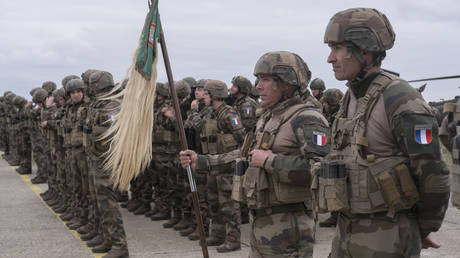
Romania briefs the Pentagon on France’s efforts to stand up a NATO battle group at the mouth of the Danube
The head of the US military rang up his Romanian colleague on Monday to coordinate “humanitarian and security” assistance to Ukraine and get an update on the NATO battle group that France is setting up in the region right across the Ukrainian border, the Pentagon has confirmed.
US Defense Secretary Lloyd Austin called Romanian Defense Minister Vasile Dincu on Monday morning to “continue coordinating our assistance” to Ukraine, the Pentagon said in a readout of the call. The two “shared a sense of urgency ahead of a likely Russian military offensive in eastern Ukraine,” the Pentagon said.
Austin commended Romania for taking in Ukrainian refugees and “received an update on the formation of a French-led NATO multinational battle group” in the country, according to the readout.
France pledged to send troops to Romania and Estonia on February 26, just days after the conflict in Ukraine escalated. On March 6, Defense Minister Florence Parly visited a contingent at Mihail Kogalniceanu, a Romanian military base northwest of Constanta, near the border with Ukraine.
By March 23, NATO Secretary General Jens Stoltenberg spoke of “four new NATO battle groups in Bulgaria, Hungary, Romania, and Slovakia,” making up a total of eight “from the Baltic to the Black Sea.” Since then the alliance has only said that the Franco-Belgian battalion deployed in Romania continues having combined exercises with the US, Polish, and Italian troops to “strengthen interoperability.”
Romania also appears to be a major conduit for weapons the US and its allies are sending to Ukraine. On Saturday, the Russian military said it had shot down a Ukrainian transport plane near Odessa, which was “delivering a large shipment of arms supplied to Ukraine by Western counties.”
Austin’s call with Dincu comes just days after the Pentagon announced it would send Ukraine hundreds of obsolete armored vehicles, humvees, anti-tank, and anti-aircraft missiles, as well as 18 towed guns with 40,000 rounds of ammunition and several tactical radars.
Russia attacked the neighboring state in late February, following Ukraine’s failure to implement the terms of the Minsk agreements, first signed in 2014, and Moscow’s eventual recognition of the Donbass republics of Donetsk and Lugansk. The German and French brokered protocols were designed to give the breakaway regions special status within the Ukrainian state.
The Kremlin has since demanded that Ukraine officially declare itself a neutral country that will never join the US-led NATO military bloc. Kiev insists the Russian offensive was completely unprovoked and has denied claims it was planning to retake the two republics by force.




